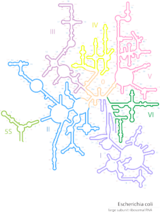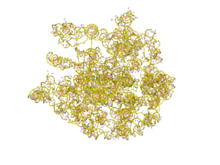This article is missing information about correct Rfam boxes: LSU_rRNA_archaea, LSU_rRNA_bacteria. (December 2020) |
The 23S rRNA is a 2,904 nucleotide long (in E. coli) component of the large subunit (50S) of the bacterial/archean ribosome and makes up the peptidyl transferase center (PTC).[2] The 23S rRNA is divided into six secondary structural domains titled I-VI, with the corresponding 5S rRNA being considered domain VII.[3] The ribosomal peptidyl transferase activity resides in domain V of this rRNA, which is also the most common binding site for antibiotics that inhibit translation, making it a target for ribosomal engineering.[2] A well-known member of this antibiotic class, chloramphenicol, acts by inhibiting peptide bond formation, with recent 3D-structural studies showing two different binding sites depending on the species of ribosome. Numerous mutations in domains of the 23S rRNA with Peptidyl transferase activity have resulted in antibiotic resistance.[4] 23S rRNA genes typically have higher sequence variations, including insertions and/or deletions, compared to other rRNAs.[5]
| 23S and 5S ribosomal RNAs | |
|---|---|
 23S and 5S rRNAs indicating nucleotide numbers, helix numbers, and domains | |
| Identifiers | |
| Other data | |
| RNA type | Gene; rRNA |
| Domain(s) | Bacteria |
| SO | SO:0001263 |
| PDB structures | PDBe |

The eukaryotic homolog of the 23S LSU rRNA is the 28S ribosomal RNA, with a region filled by the 5.8S ribosomal RNA.[6]
23S rRNA Functions
editIn general, rRNA has an essential function of peptidyl transferase. The stimulating core of the ribosome plays role in the peptide bond configuration. Both peptidyl-tRNA and aminoacyl-tRNA are important for protein synthesis and transpeptidation response.
Essential Bases
editHowever, 23S rRNA positions (G2252, A2451, U2506, and U2585) have a significant function for tRNA binding in the P site of the large ribosomal subunit.[7] These modification nucleotides in site P can inhibit peptidyl-tRNA from binding. U2555 modification can also intervene with transferring peptidyl-tRNA to puromycin. Furthermore, the chemical modification of half of these positions G2251, G2253, A2439, and U2584 can not prevent the tRNA binding. Peptidyl-tRNA of 50S subunits which binds to the P site preserve eight positions of 23S rRNA from chemical modification.[7] On the other hand, mutation in 23S rRNA can also have impacts on cell growth. Mutations A1912G, A1919G and Ψ1917C have a powerful growth phenotypes and they prevent translation while mutation A1916G has a simple growth phenotype and it leads to defect in the 50S subunits.[8]
23S rRNA Helix 26a
editThe 23S ribosomal RNA is composed of six domains forming a complex network of molecular interactions. A central single-stranded region connects all of the domains through base-pairing of the two halves, forming Helix 26a. Some consider Helix 26a to be Domain 0 due to its action as a central core and compact folding unit. Comparison of 23S and 28S ribosomal RNA sequences across species demonstrate conservation of Helix 26a. Helices continue to provide the support as the backbone of domain architecture.[9]
Plastid
editChloroplast ribosomes from "higher" plants have an additional 4.5S rRNA created by fragmentation of 23S. It is located to the 3' side of 23S in the rRNA operon and corresponds to the 3' end of non-fragmented 23S rRNA.[10]
See also
editReferences
edit- ^ Mueller F, Sommer I, Baranov P, Matadeen R, Stoldt M, Wöhnert J, Görlach M, van Heel M, Brimacombe R (2000). "The 3D arrangement of the 23 S and 5 S rRNA in the Escherichia coli 50 S ribosomal subunit based on a cryo-electron microscopic reconstruction at 7.5 Å resolution". J Mol Biol. 298 (1): 35–59. doi:10.1006/jmbi.2000.3635. PMID 10756104.
- ^ a b Walker, Allison S.; Russ, William P.; Ranganathan, Rama; Schepartz, Alanna (2020-08-18). "RNA sectors and allosteric function within the ribosome". Proceedings of the National Academy of Sciences. 117 (33): 19879–19887. Bibcode:2020PNAS..11719879W. doi:10.1073/pnas.1909634117. ISSN 0027-8424. PMC 7443888. PMID 32747536.
- ^ Zerges, William; Hauser, Charles (2009-01-01), Harris, Elizabeth H.; Stern, David B.; Witman, George B. (eds.), "Chapter 28 - Protein Synthesis in the Chloroplast", The Chlamydomonas Sourcebook (Second Edition), London: Academic Press, pp. 967–1025, ISBN 978-0-12-370873-1, retrieved 2021-10-07
- ^ Vester, Birte; Long, Katherine S. (2013). Antibiotic Resistance in Bacteria Caused by Modified Nucleosides in 23S Ribosomal RNA. Landes Bioscience.
- ^ Pei A, Nossa CW, Chokshi P, Blaser MJ, Yang L, Rosmarin DM, Pei Z (5 May 2009). "Diversity of 23S rRNA Genes within Individual Prokaryotic Genomes". PLOS ONE. 4 (5): e5437. Bibcode:2009PLoSO...4.5437P. doi:10.1371/journal.pone.0005437. PMC 2672173. PMID 19415112.
- ^ Doris, Stephen M.; Smith, Deborah R.; Beamesderfer, Julia N.; Raphael, Benjamin J.; Nathanson, Judith A.; Gerbi, Susan A. (October 2015). "Universal and domain-specific sequences in 23S–28S ribosomal RNA identified by computational phylogenetics". RNA. 21 (10): 1719–1730. doi:10.1261/rna.051144.115. PMC 4574749. PMID 26283689.
- ^ a b Bocchetta, Maurizio; Xiong, Liqun; Mankin, Alexander S. (1998-03-31). "23S rRNA positions essential for tRNA binding in ribosomal functional sites". Proceedings of the National Academy of Sciences of the United States of America. 95 (7): 3525–3530. Bibcode:1998PNAS...95.3525B. doi:10.1073/pnas.95.7.3525. ISSN 0027-8424. PMC 19869. PMID 9520399.
- ^ Long KS, Munck C, Andersen TM, Schaub MA, Hobbie SN, Bottger EC, Vester B (9 August 2010). "Mutations in 23S rRNA at the Peptidyl Transferase Center and Their Relationship to Linezolid Binding and Cross-Resistance". Antimicrobial Agents and Chemotherapy. 54 (11): 4705–4713. doi:10.1128/AAC.00644-10. PMC 2976117. PMID 20696869.
- ^ Petrov, Anton S.; Bernier, Chad R.; Hershkovits, Eli; Xue, Yuzhen; Waterbury, Chris C.; Hsiao, Chiaolong; Stepanov, Victor G.; Gaucher, Eric A.; Grover, Martha A.; Harvey, Stephen C.; Hud, Nicholas V. (2013-06-14). "Secondary structure and domain architecture of the 23S and 5S rRNAs". Nucleic Acids Research. 41 (15): 7522–7535. doi:10.1093/nar/gkt513. ISSN 1362-4962. PMC 3753638. PMID 23771137.
- ^ Bieri, P; Leibundgut, M; Saurer, M; Boehringer, D; Ban, N (15 February 2017). "The complete structure of the chloroplast 70S ribosome in complex with translation factor pY". The EMBO Journal. 36 (4): 475–486. doi:10.15252/embj.201695959. PMC 5694952. PMID 28007896.